by Jack Norris, registered dietitian and executive director of Vegan Outreach
Contents
- Nutrients in a Wide Range of Plant Foods
- Nutrients in a Select Group of Plant Foods
- Nutrients Most Easily Obtained from Supplements
- Other Versions of this Article
- References
Many vegans and aspiring vegans care about eating a healthy, balanced diet and want to be well-informed about nutrition. Vegans have a significantly reduced risk for type 2 diabetes (1, 2) and high blood pressure (3, 4), and on average have lower cholesterol levels (5).
Although there are health benefits to being vegan, there are also nutrients to be aware of. We aim to give you all the essential information you need to know about vegan nutrition in this article. For those who want it, we provide links to additional information for each nutrient.
Nutrients in a Wide Range of Plant Foods
Protein and iron are commonly thought to be difficult to obtain on a vegan diet but they’re actually easily obtained for most people.
Protein
“Where do you get your protein?” is typically the first question vegans are asked. And it’s a bit hard to answer because almost all plant foods contain protein. In other words, vegans get our protein in just about everything we eat!
Eating a serving of high-protein plant foods at most meals will provide enough protein for most vegans (the exception being some strength athletes who should experiment with varying amounts to find the best results). Anyone who’s regularly been eating meat and cheese is used to high amounts of protein and if you’re craving animal products or feeling fatigued on a vegan diet, adding more protein is often the solution.
High-protein plant foods include seitan and most vegan meats (about 15-25 grams per serving, but check the label), tempeh (about 15 grams per 1/2 cup), tofu (about 10-15 grams per 1/2 cup), peanuts (about 15 grams per 1/2 cup), beans and lentils (about 8 grams per 1/2 cup), and soymilk (about 7 grams per cup).
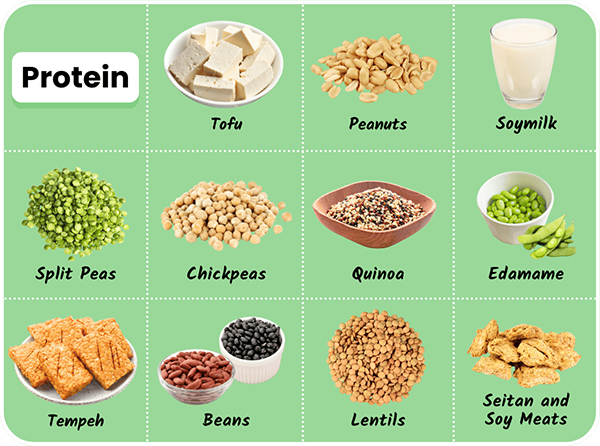
If you want a thorough discussion about plant vs. animal protein, check out the article Protein Needs of Vegans from VeganHealth.org.
Soy
Speaking of protein, soyfoods have traditionally been a staple of many vegan diets due to their high protein content. Myths abound that soy is harmful and that has made some people shy away, but there’s plenty of scientific evidence that two servings of soyfoods per day is perfectly safe. Higher amounts are probably also safe but they haven’t been studied as thoroughly. As a vegan dietitian, athlete, and someone familiar with the scientific research on soy, I happily eat as much soy as I desire!
The most robust area of research on soy has been with respect to breast cancer and the overwhelming evidence is that soy can reduce the risk of breast cancer. There’s also evidence to suggest that soy can reduce the risk of prostate cancer and heart disease (by lowering LDL cholesterol). You can read more in our article Soy: Main Controversies.
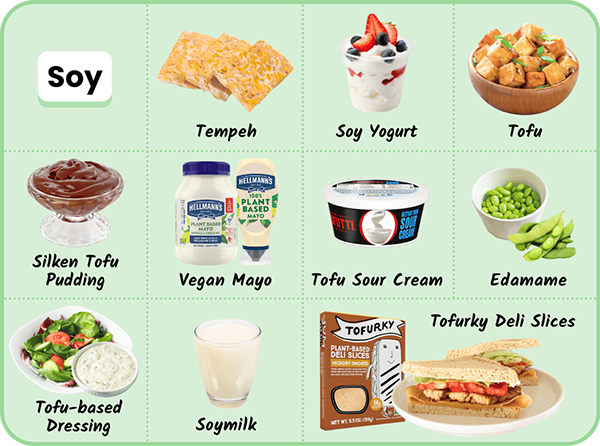
Tofu is an extremely versatile soyfood that has been eaten in some Asian cultures for hundreds of years. You can fry or bake it and add it to just about any savory dish. You can also freeze and then thaw it to give it a chewy texture. Tofu doesn’t have much taste on its own, but it takes on the flavors of the foods it’s mixed with.
Tofu is normally made with calcium salts and is therefore a rich source of calcium for vegans (check the packaging for “calcium” in the ingredients).
Another type of tofu, silken tofu, has a smooth texture and is used for making pudding, mousse, and cream-based pies. Silken tofu is often found in the baking or Asian sections of the grocery store.
While most vegans eat soyfoods, you don’t need to in order to be a vegan as there are plenty of other high-protein foods. But unless you have a specific allergy to soy, there’s no reason why you can’t enjoy it just like millions of other people throughout the world, vegans and meat-eaters alike.
Iron
People often associate iron with red meat, so you might be surprised to know that iron is plentiful in plant foods and vegans often have higher iron intakes than meat-eaters. Obtaining enough iron from vegan foods is easy if you eat legumes (beans, peas, and lentils) and dark leafy green vegetables (such as spinach and collards). Iron is found in a range of other plant foods and many countries have foods fortified with iron. Blackstrap molasses is a type of molasses that’s high in iron.
What’s more important for meeting iron needs as a vegan is to include foods high in vitamin C with meals which increases iron absorption from other foods at that meal. For example, oatmeal with orange juice at breakfast provides iron from the oats and vitamin C from the juice. The image below shows foods high in vitamin C and what amount should be eaten to significantly increase iron absorption.
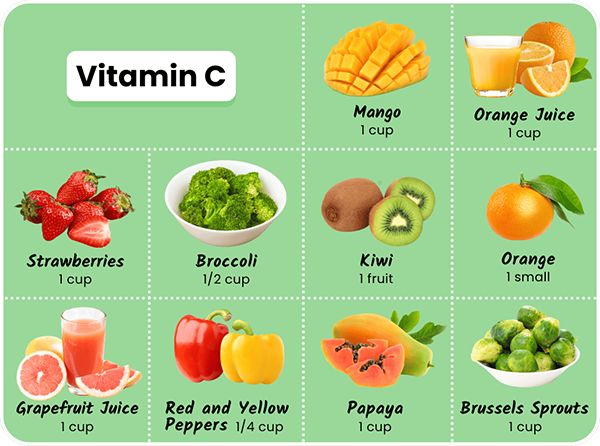
Most vegans don’t need to be too concerned about iron unless they have a history of iron deficiency. One exception is long-distance runners who menstruate, as they have a high amount of red blood cell loss. If you’re prone to iron deficiency, eat plenty of meals containing foods high in iron and vitamin C and avoid coffee and tea (which decrease iron absorption) within an hour of such meals.
Nutrients in a Select Group of Plant Foods
Vegans should pay attention to how they’re obtaining calcium, vitamin A, and omega-3s. Below, we’ll help you find good sources of these nutrients!
Calcium
Vegan adults should eat 3 servings of good sources of calcium per day while teenagers should eat 4 servings. The image below shows good sources of calcium that are readily available in the United States. The image lists the amount of each food that qualifies as one serving.
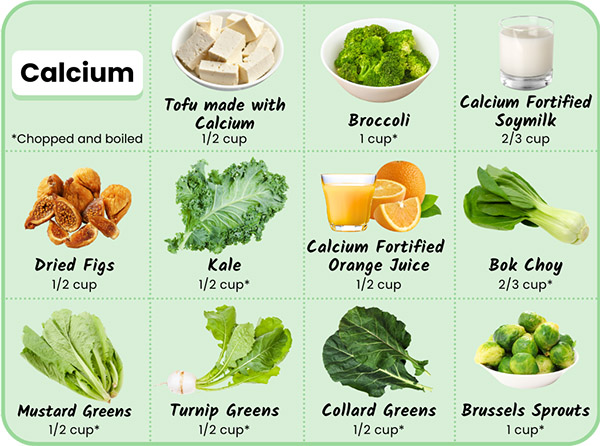
Luckily, most plant-based milks are fortified with calcium. And one of my favorite foods for obtaining calcium is tofu made with calcium salts, which is high in calcium and protein, both of which are good for bones. If you find it inconvenient to eat foods high in calcium each day, a calcium supplement of about 500 mg per day is another option.
Resistance exercise twice a week, involving lifting moderate weights, is possibly the most reliable way for people to increase the strength of their bones. We encourage everyone to follow such a program. Talk to your health professional about what program is right for you.
Vitamin A
Vitamin A is important for night vision and bone density. Vegans should eat at least two servings of good sources daily. Good sources are vegetables and fruits whose edible flesh is orange: carrots and other root vegetables (1/2 cup), squash (1/2 cup), and melons (2 cups). The orange color indicates beta-carotene which our bodies can turn into vitamin A. Dark leafy green vegetables (1 cup cooked) are also high in vitamin A. Foods with yellow flesh are generally not good sources of vitamin A.
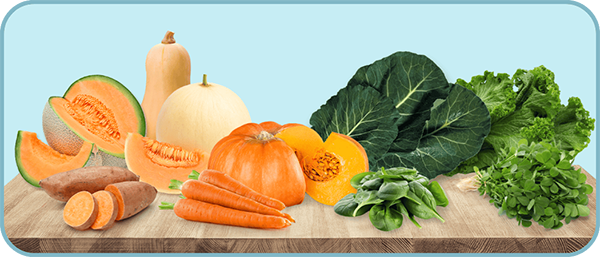
Pumpkin Mac and Cheese Recipe
A great way to help satisfy your vitamin A needs is with pumpkin mac and cheese!
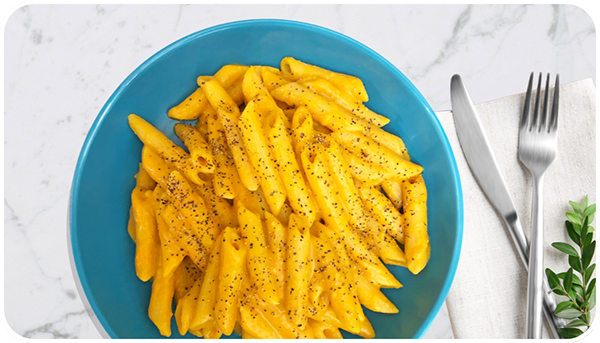
Ingredients
- 12 to 16 oz pasta
- 15 oz can of pureed pumpkin
- 1/2 tsp garlic powder
- 1/2 tsp salt
- 2 tbsp olive oil
- 1 cup of unsweetened soymilk
- 1 cup of nutritional yeast or vegan cheese
Instructions
- Cook the pasta, cool, and set aside.
- Mix the remaining ingredients in a pot on medium heat, stirring constantly, until blended (about 5 minutes).
- Add sauce to the pasta.
- Sprinkle with ground pepper before eating.
Omega-3s
Omega-3 fats are important for the long-term health of the heart and brain but are found in a limited number of plant foods. Walnuts, canola oil, flaxseeds and flaxseed oil, chia seeds, hemp seeds, and perilla oil are high in omega-3s.
Chia Seed Pudding Recipe
A delicious way to get your daily omega-3s is from chia seed pudding, which you can eat for breakfast or as a dessert.
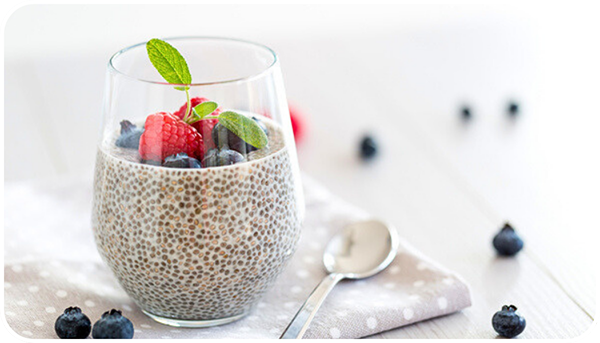
Ingredients
- 1-3/4 cups of unsweetened plant milk (or sweetened plant milk and omit the sweetener ingredient below)
- 1 to 2 tablespoons of sweetener (for example, sugar or maple syrup)
- 1/2 cup of chia seeds
- 1/2 to 1 teaspoon of vanilla extract (optional)
Instructions
- In a bowl, whisk together the ingredients.
- Chill for a few hours and stir before eating.
- Even better served with toppings, such as fruit, peanut butter, or chocolate chips.
- Keep refrigerated.
Another option is to keep a jar of hemp or ground flaxseeds in the refrigerator to sprinkle them on meals throughout the day—they’re easy to incorporate into anything you’re eating.
Nutrients Most Easily Obtained from Supplements
Nutrient deficiencies won’t occur in only a few weeks or even months of being vegan. That’s good news because it means you can go vegan at your own pace and worry about perfecting the nutrition later. In the long term, to be a thriving vegan, you’ll want to make sure you obtain a reliable source of vitamin B12, iodine, selenium, vitamin D, and in some cases zinc.
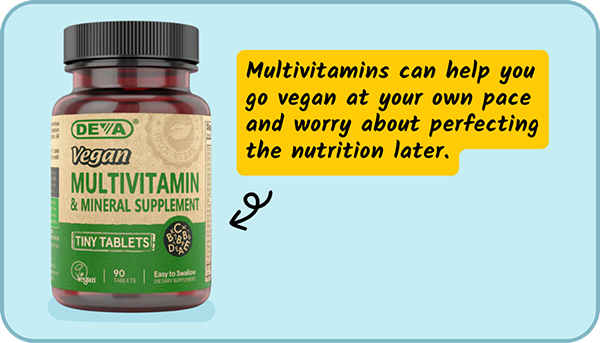
- Vitamin B12 in vegan diets has been a source of controversy and myths. Plant foods don’t contain vitamin B12 unless fortified. If you don’t get a reliable source, the chances are high that you’ll eventually develop fatigue or tingling in your fingers or toes. On the other hand, vegans who obtain a reliable source of vitamin B12 can have healthier levels than nonvegans. Additional info on vitamin B12.
- Iodine is important for a healthy thyroid. Iodine is found inconsistently in plant foods depending on the iodine content of the soil. The soil in many countries is low in iodine and so iodine has been added to some brands of table salt. You should make sure you have a source of iodine either from iodized salt or a supplement containing potassium iodide. For supplements, if convenient choose potassium iodide over kelp. Additional info on iodine.
- Selenium is lacking in the soil in many countries and so a multivitamin with selenium is the most reliable source. Soil in the United States, Canada, and India has enough selenium for vegans there not to be concerned. Additional info on selenium.
- Vitamin D deficiency can result in fatigue and muscle and bone pain. Vitamin D can be created by skin exposure to sunshine (10-15 minutes for people with light skin, 20 minutes for people with dark skin, 30 minutes for seniors) when the sun is direct enough to cause sunburn. But to avoid skin cancer, dermatologists recommend obtaining vitamin D from supplements rather than sunshine. The dietary reference intake (DRI) for most age groups is 600 IU per day. Additional info on vitamin D.
- Zinc intakes from food are usually adequate for most vegans, but some vegans might fall a bit short. Symptoms of zinc deficiency include catching frequent colds or developing cracks at the corners of your mouth. Additional info on zinc.
Supplement Recommendations
We recommend that vegans take a daily multivitamin that contains the amounts of nutrients listed in the table below. These amounts are not the recommended daily allowances (RDAs), but rather the amounts that will meet the needs of vegans after taking into account what vegans typically obtain through foods.
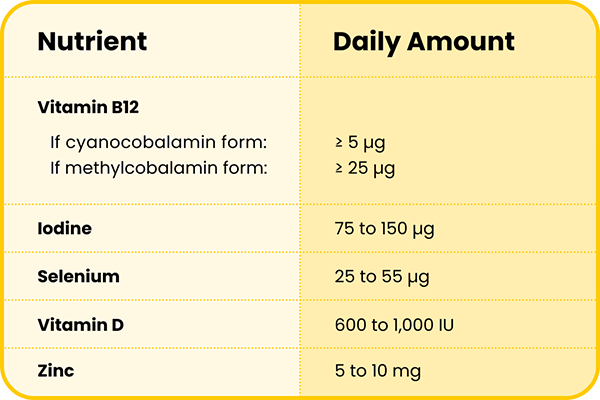
Good options for meeting these requirements are:
- Australia: One tablet of the DEVA Vegan Multivitamin Tiny Tablets contains 6 µg of B12, 75 µg of iodine, 800 IU of vitamin D, 5 mg of zinc, and 36 µg of selenium.
- Canada: One tablet of the DEVA Vegan Multivitamin and Mineral Support contains 6 µg of B12, 75 µg of iodine, 400 IU of vitamin D, 5 mg of zinc, and 36 µg of selenium.
- Kenya: One tablet of the Holland and Barrett Vegan Multivitamin and Mineral contains 10 µg of B12, 150 µg of iodine, 400 IU of vitamin D, 10 mg of zinc, and 55 µg of selenium.
- New Zealand: One tablet of the Holland and Barrett Vegan Multivitamin and Mineral contains 10 µg of B12, 150 µg of iodine, 400 IU of vitamin D, 10 mg of zinc, and 55 µg of selenium.
- Phillippines: Two tablets of the Herbs and Earth MultiVeg Vegan Multivitamins contain 67 µg of B12, 267 IU of vitamin D, 10 mg of zinc, 33 µg of selenium, and kelp for iodine (it’s not clear how much but given that the Philippines is close to water, the food supply should contain enough iodine to make up the rest).
- Singapore: One tablet of the DEVA Multivitamin and Mineral Supplement contains 6 µg of B12, 75 µg of iodine, 800 IU of vitamin D, 5 mg of zinc, and 36 µg of selenium.
- South Africa: One tablet of the Viridian Essential Vegan Multi contains 500 µg of B12, 150 µg of iodine, 400 IU of vitamin D, 10 mg of zinc, and 50 µg of selenium.
- United Kingdom: One tablet of the VEG 1 Blackcurrant contains 25 µg of B12, 150 µg of iodine, 800 IU of vitamin D, and 60 µg of selenium. For an option with zinc, one tablet of Holland and Barrett ABC-Z Multivits and Minerals High Strength Vegan contains 10 µg of B12, 150 µg of iodine, 1,000 IU of vitamin D, 10 mg of zinc, and 55 µg of selenium.
- United States: One tablet of the DEVA Tiny Tablets contains 6 µg of B12, 75 µg of iodine, 800 IU of vitamin D, 5 mg of zinc, and 36 µg of selenium.
Other Versions of this Article
- Albania: Këshilla të të Ushqyerit për Veganët
- Argentina: Consejos para personas veganas
- Austria: Ernährungstipps für VeganerInnen
- Bangladesh: ভিগানদের জন্য পুষ্টিবিষয়ক তথ্য
- Belarus: Советы по питанию для веганов
- Bolivia: Consejos para personas veganas
- Brazil: Dicas de Nutrição para Pessoas Veganas
- Bulgaria: Съвети за Хранене за Вегани
- Chile: Consejos para personas veganas
- Colombia: Consejos para personas veganas
- Costa Rica: Consejos para personas veganas
- Croatia: Nutritivni saveti za vegane
- Czech Republic: Výživové tipy pro vegany
- Dominican Republic: Consejos para personas veganas
- Ecuador: Consejos para personas veganas
- Egypt: نصائح غذائية للنباتيين
- Estonia: Toitumisnõuanded veganitele
- France: Conseils nutritionnels pour végétaliens
- Germany: Ernährungstipps für VeganerInnen
- Greece: Διατροφικές συμβουλές για βίγκαν
- Hungary: Táplálkozási Tanácsok Vegánoknak
- India: Nutrition Tips for Vegans
- Indonesia: Tips Nutrisi untuk para Vegan
- Ireland: Nutrition Tips for Vegans
- Italy: Consigli nutrizionali per vegani
- Japan: ヴィーガンのための栄養ガイド
- Kosovo: Këshilla të të Ushqyerit për Veganët
- Malaysia: Tip Nutrisi Buat Vegan
- Mexico: Consejos para personas veganas
- Morocco: نصائح تغذية للنباتيين و النباتيات
- Myanmar: vegan များအတွက် အာဟာရအကြံပြုချက်များ
- Nigeria: Nutrition Tips for Vegans
- Pakistan: ویگنز کے لئے غذائیتی مشورے
- Panama: Consejos para personas veganas
- Peru: Consejos para personas veganas
- Poland: Wskazówki żywieniowe dla wegan
- Portugal: Dicas de Nutrição para Veganos
- Puerto Rico: Consejos para personas veganas
- Romania: Informații despre nutriție pentru vegani
- Russia: Советы по питанию для веганов
- Serbia: Nutritivni saveti za vegane
- South Korea: 비건을 위한 영양팁
- Spain: Consejos para personas veganas
- Sweden: Näringstips för veganer
- Switzerland: Ernährungstipps für VeganerInnen
- Taiwan: Vegan全植物飲食的營養秘訣
- Thailand: เคล็ดลับโภชนาการสำหรับคนทานวีแกน
- Turkey: Veganlar için Beslenme Önerileri
- Ukraine: Поради щодо харчування для веганів
- Vietnam: Thông tin dinh dưỡng cho người ăn thuần chay